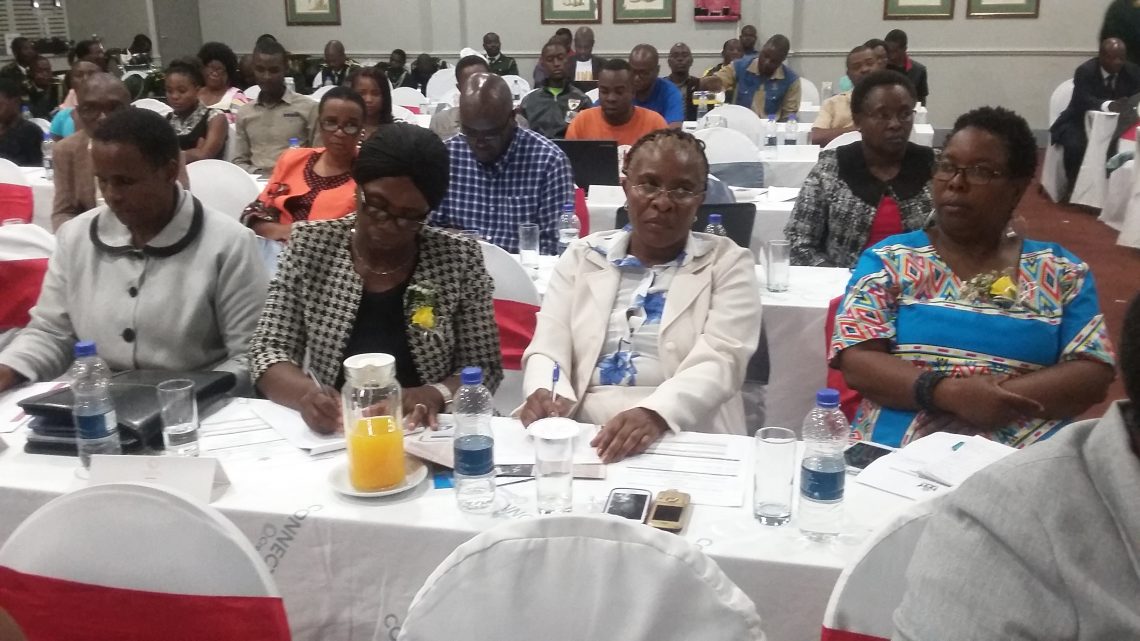By Byron Mutingwende
A Cabinet minister has bemoaned the increasing levels of sexual harassment cases in society, with the scourge rampant in tertiary institutions as the current economic hardhips take their toll on women and girls.
Nyasha Chikwinya, the minister of women affairs, gender and community development made the remarks during the launch of the 16 Days of Activism Against Gender Based Violence held at Cresta Jameson Hotel in Harare on 25 November 2017.
“It is disheartening to note the levels of sexual harassment in our tertiary institutions. The levels have been made worse by the harsh economic conditions the country has been experiencing over the years. “Sexually transmitted marks” have become a common phenomenon as students are given a good mark in exchange for sexual favours.
“In addition lack of accommodation in tertiary institutions has further, exposed most girls to sexual abuse by sugar daddies,” Chikwinya said.
The minister said the practice resulted in tertiary institutions churning out half-baked graduates, a situation that compromised the quality of education in the country.
Chikwinya said the female students who resist such temptations would often be made to fail by the abusive lecturers resulting in competent students failing to make it into the world of work or spending more time at college or university. The situation therefore demands the cooperation of stakeholders in curbing the scourge, she said.
The 25th of November marks the beginning of the 16 Days of Activism against Gender Based Violence which is an internationally recognised campaign on ending Gender Based Violence.
Zimbabwe joined the rest of the world in commemorating the 16 Days of Activism against Gender Based Violence. The campaign aims to raise awareness on gender based violence as a human rights issue; to strengthen local work around gender based violence; to provide a forum for sharing progress, strategies and challenges in ending gender based violence; and to demonstrate solidarity with survivors of gender based violence.
Zimbabwe has domesticated the theme “From peace in the home to peace in the world: Creating safe spaces for women and girls”.
The theme comes at a time when Domestic Violence and Gender Based Violence continue to be rife in communities. The Zimbabwe Demographic Health Survey (2015) Reports that the prevalence rate of domestic violence is at 35%. Similarly, sexual harassment cases in public places, institutions of higher learning and at work places also continue to be a cause of concern.
Yu Yu, the United Nations Population Fund (UNFPA) Deputy Representative in Zimbabwe said as a response to the scourge, the UN agency has launched three transformative goals in its strategic plan for 2018 to 2021. UNFPA supports member countries to achieve maternal mortality, zero unmet needs for family planning and zero GBV and harmful practices. It also views the elimination of GBV as central to achieving universal access to sexual reproductive health and rights.
He said GBV has devastating effects on the physical and mental health of victims.
“Physical trauma and injury, infection with sexually transmitted infections including HIV and AIDS and unwanted pregnancies are some of the worst effects of rape. Apart from physiological damage, rape causes emotional trauma to victims which can last for a lifetime if not adequately treated,” Yu Yu said.
The UN official expressed concern over the low number of survivors of sexual gender based violence who report to health facilities within 72 hours of the incidence.
“According to the Zimbabwe Demographic Health Survey, about 300 000 women of child bearing age experienced GBV in 2016. Of these women only 12 000 or 4% sought health services while at least 3 300 or 1% accessed health services within 72 hours. From these statistics, it is abundantly clear that the vast majority of survivors of GBV do not seek help.”
Blessing Muyambo, the Women’s Rights Project Officer of ActionAid Zimbabwe said women living in poverty and exclusion enjoy the least right to the city but have the highest survival needs, making them most vulnerable to sexual violence in urban spaces.
“Violence against women and girls in public spaces has been normalised although laws and policies exist and provisions of the Constitution, to include Section 52 of the Constitution of Zimbabwe which states that, “Every person has the right to bodily and psychological integrity which includes the right to freedom from all forms of violence from public or private source…”
According to the 2015 ZDHS, 35% of women aged 15 to 49 have experienced physical violence, 14% had experienced sexual violence at least once in their lifetime. In a Baseline study commissioned by ActionAid in 2015, 44% of wome did nothing in response to violence hence ActionAid is focused on raising awareness on the reporting mechanisms guided by the Protocol on the Multi-Sectoral Management of Sexual Abuse and Violence in Zimbabwe.
The Dariro Arts Film and Drama Group is involved in the fight against gender based violence through various forms of arts like drama, films and music.
“We are setting up a television a television programme that involves men and boys in the prevention of GBV. Our film programme will provide a better understanding on the importance of men and boys in preventing GBV. Their involvement will ensure that the rights of women and girsl are respected and protected,” said Moderate Kasvosve, the Director of Dariro Arts Film and Drama Group.
